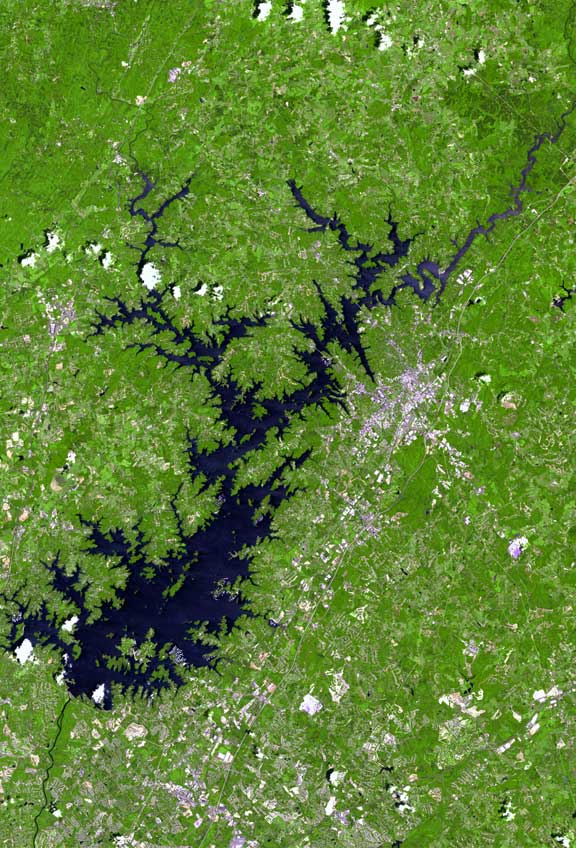
Moving to Lake Lanier, Georgia: A Comprehensive Relocation Guide
Considering moving to Lake Lanier, Georgia? This premier recreational lake offers waterfront lifestyle, resort amenities, and North Georgia location. With lakefront communities spanning multiple counties in 2025, Lake Lanier combines boating paradise with proximity to Atlanta and Georgia’s ultimate lake living destination.
Demographic Profile to Consider If Moving to Lake Lanier:
Lake Lanier isn’t a single city but rather a 38,000-acre reservoir spanning five counties (Hall, Forsyth, Dawson, Gwinnett, and parts of Lumpkin) in North Georgia. Lakefront communities include Buford, Cumming, Gainesville, Dawsonville, and numerous unincorporated areas. The demographic profile varies by specific location, generally including affluent families, retirees, professionals, and weekend visitors. Lakefront properties attract upper-middle to upper-class residents seeking waterfront lifestyle. The lake features 692 miles of shoreline with marinas, resorts, restaurants, and residential communities ranging from modest lake cottages to luxury estates. Lake Lanier attracts those prioritizing water recreation, boating lifestyle, and resort atmosphere within reach of Atlanta. The community values lake activities, property aesthetics, and outdoor living. Find trusted local services for moving, living, and working in Lake Lanier.Lake Lanier Relocation Directory
Cost of Living to Consider If Moving to Lake Lanier:
Lake Lanier waterfront properties represent premium pricing for North Georgia. Lakefront home values range from $600,000 to $3 million+ in 2025, depending on location, amenities, and water access quality. Non-waterfront properties in lake communities range from $350,000 to $700,000. Median household incomes in lake communities exceed $90,000. Rental properties average $2,000 to $4,000+ monthly for lakefront homes. Georgia’s state income tax is 5.75%. Overall cost of living reflects premium waterfront location and resort amenities. Lake Lanier attracts affluent professionals, successful business owners, and wealthy retirees seeking premier Georgia lake lifestyle. Waterfront costs create exclusivity while various access levels (deep water, cove, view) provide options. Boat ownership, dock permits, and lake maintenance add expenses.
Economy and Job Market:
Lake Lanier residents typically commute to Atlanta or work in surrounding communities. The lake itself generates economic activity through marinas, resorts, restaurants, boat services, and vacation rentals. Lake Lanier Islands Resort employs hospitality workers. Major nearby employers include Northeast Georgia Medical Center in Gainesville, various Forsyth County businesses, and companies throughout the region. Many residents work in professional services, healthcare, technology, and corporate sectors requiring Atlanta commutes. Some residents are retirees or business owners. Typical commute times to Atlanta range 45-75 minutes depending on specific lake location. The lake economy includes marine services, real estate, hospitality, and vacation rental management.
Education:
School districts vary by location around Lake Lanier. Forsyth County Schools (highly rated), Hall County Schools, Dawson County Schools, and Gwinnett County Public Schools serve different areas. Families research specific school districts when choosing lake locations. The quality varies dramatically, with Forsyth County schools attracting many families. University of North Georgia, Gainesville campus operates in the region. The educational infrastructure depends on specific community location.
Recreation and Lifestyle:
Lake Lanier offers world-class water recreation with 692 miles of shoreline providing endless boating, fishing, swimming, water skiing, wakeboarding, and sailing opportunities. The lake hosts fishing tournaments, poker runs, and boating events. Lake Lanier Islands Resort features water park, beaches, golf, zip lines, and accommodations. Marinas throughout the lake provide services, boat rentals, and dining. Holiday Marina, Aqualand Marina, Sunrise Cove, and others serve boaters. Residents enjoy lakefront dining at restaurants accessible by boat. The U.S. Army Corps of Engineers manages public parks including Margaritaville at Lanier Islands and numerous day-use areas. The lifestyle revolves entirely around boating, water sports, lakefront entertaining, and dock life. Year-round mild climate extends the boating season. The community values waterfront aesthetics, boating culture, and lake stewardship. Living at Lake Lanier means dock becomes extension of home and weekends center on water activities. The lake creates resort lifestyle within Atlanta’s reach.
Healthcare and Services:
Lake Lanier residents access healthcare through facilities in surrounding communities including Northeast Georgia Medical Center in Gainesville, Northside Hospital Forsyth in Cumming, and other regional facilities. The Atlanta metro’s extensive healthcare infrastructure is accessible. Emergency services operate throughout the lake area.
Transportation:
Lake Lanier is accessed via Interstate 985, Georgia State Route 400, Interstate 85, and various roads depending on specific location around the 38,000-acre lake. Hartsfield-Jackson Atlanta International Airport ranges 50-75 minutes depending on lake location. Most residents use personal vehicles and boats. Waterfront properties require boat access. Typical commute times to Atlanta vary significantly based on which part of the lake (southern areas closer, northern areas more distant).
Conclusion:
Moving to Lake Lanier in 2025 offers premier waterfront living with boating lifestyle, resort amenities, and Atlanta proximity. The lake’s combination of 692 miles of shoreline, water recreation, and convenient metropolitan access makes it ideal for boating enthusiasts, affluent families, and water lovers seeking North Georgia’s ultimate lake destination where every day is a lake day and waterfront living defines the good life within reach of Atlanta.

